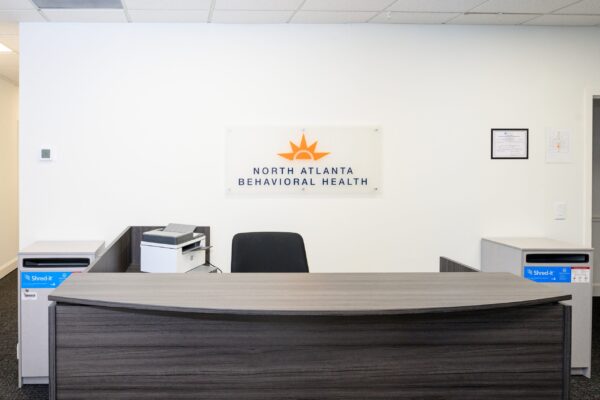Eating disorders are often rooted in an underlying mental or emotional health issue, such as low self-esteem, trauma, or depression. Thus, treatment programs must provide comprehensive services to address all aspects of a person’s health and wellness. Our eating disorder treatment in Atlanta helps people struggling with this complex, and sometimes deadly, disorder.
North Atlanta Behavioral Health knows how challenging it can be to treat an eating disorder. Our caring and compassionate team will help you build the healthy habits and coping skills you need to make a full recovery.
If you or a loved one is struggling with an eating disorder, call us today at 770-230-5699 or verify your insurance now.
How Does Our Eating Disorder Treatment in Atlanta Work?
Our eating disorder treatment works by helping the person get to the root cause of their disorder. Oftentimes, people with eating disorders have a distorted self-image. They also have excessive guilt and shame that leads to harsh forms of self-punishment, like restricting food from themselves or excessive exercise.
Furthermore, a person with an eating disorder is more likely to engage in other self-harming behaviors like cutting or burning themselves, according to MedlinePlus.
Thus, treatment for eating disorders involves more than getting to the root cause. The person must now learn healthy ways to think about themselves and change their self-image. They also need to learn healthy eating habits and address maladaptive coping mechanisms.
Therefore, our eating disorder treatment in Atlanta involves a comprehensive approach over a few months. That way, clients get the time they need to develop new habits and learn healthy coping strategies to prevent a relapse of disordered eating.
In addition, our holistic approach involves teaching healthy ways to exercise, manage stress, and nutritional counseling.
3 Types of Eating Disorders
Not all eating disorders are the same. Each one varies in behavioral presentation as well as causes. However, all types of eating disorders can be treated.
The following are three of the most common types of eating disorders:
Anorexia Nervosa
Anorexia nervosa is an eating disorder characterized by a strong fear of gaining weight. A person with anorexia has a distorted self-image. No matter what they look like, they see themselves as overweight. In fact, people with anorexia have an abnormally low body weight due to their intense fear of weight gain.
As a result of their distorted self-image, someone with anorexia will go to extreme lengths to lose weight. They will severely restrict the amount of food they eat, often to the point of near starvation. In addition, people with anorexia might force themselves to vomit, take laxatives, or exercise excessively.
Bulimia Nervosa
Like anorexia, a person with bulimia nervosa is intensely concerned about their body weight. However, they cycle between binge-eating and purging. This means they eat large amounts of food and then attempt to rid themselves of the excess calories by purging.
Thus, bulimia isn’t characterized by starving oneself. Rather, the person overeats—usually alone—and then feels guilt and shame as a result. After that, they try to maintain their desired weight by purposely vomiting or misusing laxatives.
Binge Eating Disorder
Binge eating disorder occurs when a person can’t stop overeating. This doesn’t mean they occasionally have second or third helpings, like during holidays or when eating a favorite meal. When a person has a binge eating disorder, they regularly eat unusually large amounts of food.
People with this eating disorder feel guilt and shame about how much food they eat. However, they can’t seem to control their eating habits. They might even go through periods of following a strict diet or cutting back on food intake. Unfortunately, they have intense urges and underlying mental health issues that eventually drive them back to overeating.
How Common Are Eating Disorders?
According to the National Eating Disorders Association (NEDA), “9% of the US population, or 28.8 million Americans will have an eating disorder in their lifetime.” Eating disorders are more common among women (8.60%) than men (4.07%).
Although eating disorders aren’t among the most common psychiatric disorders, they are among the most deadly. The NEDA explains that “[e]ating disorders have the second highest mortality rate of any psychiatric illness behind opiate addiction.”
What Causes an Eating Disorder?
The causes of an eating disorder aren’t known. However, there are some potential genetic and biological causes of the disorder. In other words, certain genes or chemical imbalances in the brain might cause eating disorders.
Although the exact causes of eating disorders are unknown, some people are at a higher risk than others. The following are risk factors for eating disorders:
- Family history. People who have close relatives and family members with eating disorders are more likely to develop one as well.
- Frequent dieting. A person who struggles with finding a successful diet plan to control their weight is at a higher risk of developing an eating disorder.
- Hunger or starvation. Sometimes, people who experience frequent hunger or starvation in their lives could develop an eating disorder. This is because hunger and starvation change a person’s appetite and eating habits—and these changes are similar to the symptoms of eating disorders.
- Bullied or pressured due to weight. When a person is bullied or teased about their weight, they could develop an eating disorder as a result. In addition, those pressured to maintain a certain weight for sports, modeling, acting, or other activities might engage in unhealthy eating habits, like purging or undereating.
A person with an eating disorder can also have co-occurring mental health issues, like low self-esteem, anxiety, trauma, or depression. Since eating disorders most often result from cognitive distortions related to self-image and appearance, psychotherapy can help the person regain a healthy sense of self.

Types of Therapy We Provide at North Atlanta Behavioral Health
Every person has unique needs when they enter our eating disorder treatment in Atlanta. That is why we offer several types of therapy for our clients. Each type of therapy can help with the underlying causes as well as co-occurring conditions related to eating disorders.
We provide the following types of therapy:
- Cognitive-Behavioral Therapy (CBT): CBT is one of the most therapeutic modalities and can treat several disorders. This type of therapy helps clients identify unhealthy thought patterns and beliefs. Then, they can work on changing their thoughts—and thus, change their behaviors.
- Dialectical Behavior Therapy (DBT): DBT is a type of therapy derived from CBT to treat people with borderline personality disorder (BPD). However, many people benefit from DBT regardless of their disorder. This is because DBT helps clients learn how to manage intense emotional reactions and improve their distress tolerance.
- Individual Therapy: All our clients get one-on-one therapy sessions during our outpatient programs. Individual therapy gives clients focused attention on issues they aren’t comfortable sharing with a group. It also helps clients hone in on specific problems that can’t be addressed during group sessions.
- Group Therapy: During group therapy, clients share their experiences under the guidance of a licensed therapist. This helps clients learn from each other and can reduce shame by hearing similar struggles from others.
- Family Therapy: Behavioral health disorders, like eating disorders, affect the entire family. In addition, family support can have a significant impact on long-term recovery. During family therapy, clients and their families rebuild their relationships to find healthy ways of supporting and loving one another.

Benefits of Outpatient Treatment for an Eating Disorder in Atlanta
- Learn about the causes of eating disorders
- Develop healthy eating habits
- Reduce shame and guilt about eating habits and body weight
- Find healthy ways to cope with low self-esteem, triggers, and stress
- Treat issues that co-occur with eating disorders
- Find a community of like-minded people improving their mental health
- Begin a journey of lifelong recovery from eating disorders to live a healthy and fulfilling life

By NABH Staff
Medically Reviewed by
Erika Dalton, LMSW.
Last Updated on March 18, 2024
Get Help Now
Begin Depression Treatment in Atlanta Today
Mental health disorders cannot be treated by treating the symptoms alone. We use holistic and evidence-based methods to treat the entire individual.
Facility Image Gallery
Start Eating Disorder Treatment Today
Eating disorders require specialized treatment from caring and compassionate professionals. These complex disorders are often rooted in other mental health issues, such as depression, trauma, and low self-esteem. During our eating disorder treatment in Atlanta, Georgia, we address the underlying causes while helping clients build healthy eating habits to improve their overall health and well-being.
Contact North Atlanta Behavioral Health today to begin eating disorder treatment.

Treatment Philosophy
North Atlanta Behavioral Health is dedicated to the health and happiness of our clients. We offer personalized treatment plans that put each individual’s needs first.

Meet Our Team
Our multidisciplinary team wants nothing more than for our clients to achieve a lifetime of recovery and sobriety. Let us help you get the most out of treatment.













 I have been to my fair share of mental health programs and this one was extremely small, intimate and every staff member I have ever had contact with has been completely professional, compassionate, and caring.
I have been to my fair share of mental health programs and this one was extremely small, intimate and every staff member I have ever had contact with has been completely professional, compassionate, and caring.










